
Journal of Specialised Translation
Scope & Guideline
Advancing the Art of Translation Studies
Introduction
Aims and Scopes
- Interdisciplinary Approaches to Translation:
The journal embraces an interdisciplinary perspective, integrating insights from linguistics, cultural studies, and technology to enrich translation practices and theories. - Focus on Audiovisual Translation (AVT):
A significant portion of the publications addresses audiovisual translation, including subtitling, dubbing, and audio description, reflecting the growing relevance of media accessibility and localization. - Research on Translation Technologies:
The journal highlights the role of emerging technologies in translation, such as machine translation and computer-assisted translation tools, exploring their impact on the profession. - Social Justice and Ethics in Translation:
There is a strong emphasis on the ethical dimensions of translation, including social justice issues, which informs translation practices in various contexts such as healthcare and humanitarian work. - Training and Professional Development:
Research on translator training, competency development, and the evolving landscape of translation education is a core area, underscoring the importance of preparing future professionals.
Trending and Emerging
- Accessibility and Inclusion in Translation:
Recent publications highlight the importance of making media accessible to diverse audiences, including the d/Deaf and hard-of-hearing communities, showcasing innovative approaches in audio description and subtitling. - Machine Translation and Post-Editing:
There is a growing body of work investigating the integration of machine translation technologies and the implications for post-editing practices, reflecting the industry's shift towards automation. - Community and Collaborative Translation Practices:
Emerging themes around community-based translation efforts and collaborative practices indicate a trend towards inclusive approaches that engage non-professionals in translation activities. - The Role of Translation in Social Movements:
Research focusing on the intersection of translation and activism has gained traction, exploring how translation practices can serve as tools for social justice and community empowerment. - Cultural and Linguistic Diversity in Translation:
An increasing focus on the representation and translation of minoritized languages and cultures is evident, emphasizing the need for equitable practices in translation.
Declining or Waning
- Traditional Literary Translation:
There has been a noticeable shift away from discussions focused solely on literary translation practices. Instead, the journal has increasingly prioritized more specialized fields, such as audiovisual translation and technical translation. - Historical Perspectives on Translation:
Research papers that delve into historical contexts of translation have become less prevalent, indicating a possible waning interest in this area compared to contemporary issues. - Translation of Non-technical Texts:
The focus on non-specialized texts and general translation practices appears to be diminishing, with a greater emphasis now placed on specialized domains like medical and legal translation.
Similar Journals
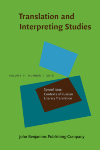
Translation and Interpreting Studies
Unveiling the Dynamics of Translation and Interpreting.Translation and Interpreting Studies is a prestigious academic journal published by John Benjamins Publishing Co, focused on the dynamic fields of translation and interpreting. Established in 2011, this journal has rapidly ascended to become a leading platform in its domain, achieving Q1 quartile status in Linguistics, Language, and Literature categories as of 2023. With an impressive ranking of #16 out of 1106 in Arts and Humanities for Literature and Literary Theory, and #182 out of 1088 in Language and Linguistics, it is recognized for its significant contributions to scholarly discourse. Although not fully open-access, the journal provides essential insights and research findings for linguists, translators, interpreters, and students, fostering a greater understanding of the theoretical and practical implications of translation studies. Situated in the Netherlands, it plays a vital role in the global academic community, bridging gaps between theory and practice, and ensuring that cutting-edge research is readily accessible to professionals and scholars alike.
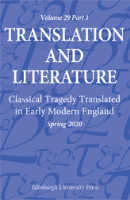
Translation and Literature
Pioneering Research at the Intersection of Translation and Literary TheoryTranslation and Literature is a leading academic journal published by Edinburgh University Press, focusing on the intricate relationship between language and literature within the realms of translation studies. With an ISSN of 0968-1361 and an E-ISSN of 1750-0214, this journal provides a crucial platform for scholars and practitioners to explore and disseminate research that addresses both the theoretical and practical aspects of translation. Since its inception in 1996, Translation and Literature has established itself as an essential resource, particularly noted for its contributions to the fields of linguistics and literary theory, as indicated by its Q4 ranking in both categories in 2023. The journal's articles are designed to foster dialogue across disciplines, encouraging innovative thinking and collaboration among researchers, professionals, and students alike. Access to this valuable resource is currently available through subscription, ensuring high-quality scholarship reaches a diverse audience dedicated to advancing the understanding of translation's role in literature.
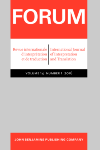
Forum-Revue Internationale d Interpretation et de Traduction-International Journal of Interpretation and Translation
Exploring Innovative Perspectives in Translation Studies.Forum-Revue Internationale d’Interprétation et de Traduction - International Journal of Interpretation and Translation is a prestigious peer-reviewed journal published by John Benjamins Publishing Co, renowned for its contributions to the fields of linguistics and literary theory. With an ISSN of 1598-7647 and an E-ISSN of 2451-909X, this journal provides a vital platform for researchers, professionals, and students to disseminate and engage with innovative research findings and theoretical developments in interpretation and translation studies. As of 2023, it holds a respectable Q3 ranking in Linguistics and Language and a Q2 in Literature and Literary Theory, underscoring its growing influence within academia, reflected by its Scopus rankings. The journal encompasses a diverse array of perspectives and methodologies to enhance the understanding of translation practices and their implications in contemporary society. Although the journal operates within a limited open access framework, its commitment to high-quality scholarship makes it an essential resource for those seeking to contribute to and stay abreast of advancements in this dynamic field. Established to foster interdisciplinary dialogue, the journal invites submission from a wide range of scholarly approaches and encourages collaborative discourse among linguists, translators, and literary theorists.

Cadernos de Traducao
Fostering dialogue in Language, Linguistics, and Literature.Cadernos de Tradução, published by the Universidade Federal de Santa Catarina, is an esteemed open-access journal dedicated to fostering scholarship in the fields of Language, Linguistics, and Literature. Since its inception in 1996, this journal has emerged as a vital platform for research, particularly known for its rigorous peer-review process and commitment to academic excellence. With a Q2 ranking in Linguistics and Language and a Q1 ranking in Literature and Literary Theory as of 2023, it stands out in the global academic landscape, holding significant positions in Scopus rankings across various categories. Researchers, professionals, and students will find a wealth of interdisciplinary studies that contribute to current discussions and advancements in translation theory and practice. The journal's open-access model enhances visibility, ensuring that groundbreaking research is accessible to a wide audience, thus promoting dialogue and collaboration within the international academic community.

Linguistica Antverpiensia New Series-Themes in Translation Studies
Exploring the Nexus of Language and TranslationLinguistica Antverpiensia New Series-Themes in Translation Studies is a premier academic journal dedicated to advancing the field of translation studies through innovative research and critical analysis. Published by ACADEMIC & SCIENTIFIC PUBLISHERS-ASP in Belgium, this journal features a diverse range of scholarly articles that explore the complex interplay between linguistics and translation, making it an essential resource for researchers, professionals, and students alike. With a noteworthy Q1 ranking in the categories of Linguistics and Language, it is positioned within the top 25% of journals in its field according to the latest 2023 Scopus rankings. The journal fosters an open dialogue on current themes and methodological advancements in translation, which contributes significantly to the academic discourse globally. Through its commitment to high-quality, peer-reviewed content, Linguistica Antverpiensia aims to cultivate a deeper understanding of language dynamics and their role in effective translation practices, ensuring its relevance in a rapidly evolving linguistic landscape.
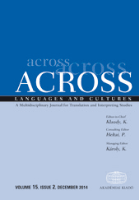
Across Languages and Cultures
Cultivating Multidisciplinary Perspectives in LinguisticsAcross Languages and Cultures is a leading journal in the field of Linguistics and Language, published by AKADEMIAI KIADO ZRT in Hungary. With its ISSN 1585-1923 and E-ISSN 1588-2519, the journal has established itself as a prominent platform for advancing research and discussion in the dynamics of language across diverse cultural contexts. Its impressive Q1 category ranking indicates its significant influence, with a Scopus rank of #227 in Language and Linguistics, showcasing its robust academic impact (79th percentile). This journal, converging from 2007 to 2024, aims to foster interdisciplinary dialogue and promote innovative research methodologies in multilingual studies. Though not an open-access journal, Across Languages and Cultures provides invaluable insights for researchers, professionals, and students eager to explore the intricacies of language use and its sociocultural implications. Located at Budafoki Ut 187-189-A-3, H-1117 Budapest, Hungary, it continues to serve as an essential resource for those passionate about the linguistic sciences.
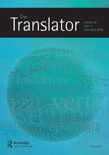
Translator
Illuminating the Intersection of Language and CultureTranslator is a leading journal in the fields of Communication and Linguistics, dedicated to exploring the complex dynamics of translation through critical analysis and scholarly discourse. Published by Routledge Journals, Taylor & Francis Ltd from the United Kingdom, this journal boasts a significant impact within its academic community, holding a prestigious Q1 ranking in Linguistics and Language and a Q2 ranking in Communication as of 2023. With a strong focus on interdisciplinary studies, it aims to foster an understanding of translation as both a linguistic and culturally significant practice. Researchers and practitioners alike can engage with cutting-edge research and extensive discourse, making it a valuable resource for advancing knowledge in this vital field. The journal spans a remarkable convergence of insights from 1995 to 2024, reflecting its long-standing commitment to academic excellence and innovation. Access to its resources is facilitated through various platforms, ensuring that findings are readily available to the broader academic community.

Perspectives-Studies in Translation Theory and Practice
Unveiling New Perspectives in Translation StudiesPerspectives-Studies in Translation Theory and Practice, a leading journal published by Routledge Journals, Taylor & Francis Ltd, serves as a pivotal platform for the exploration of translation studies, fostering dialogue among researchers, professionals, and students in the fields of cultural studies, linguistics, and literature. Established in 1996, this esteemed journal has consistently maintained its position within the Q1 quartile in both cultural studies and linguistics, thanks to its rigorous peer-review process and dedication to high-quality scholarship. With an impressive ranking of 6th out of 1106 in Arts and Humanities Literature and Literary Theory on Scopus, Perspectives stands out as a vital resource for those seeking to enrich their understanding and engage with evolving translation theories and practices. The journal is not open access, yet it remains influential in shaping discourse and advancing knowledge within its dynamic and interdisciplinary field. Researchers and students alike will find valuable insights in its contributions, making it an essential addition to any academic library.

Trans-Revista de Traductologia
Empowering Voices in Translation and LinguisticsTrans-Revista de Traductologia, an esteemed journal in the realm of Translation Studies and Linguistics, is published by the University of Malaga's Faculty of Philosophy and Letters. With an Open Access model since 2015, it facilitates the global dissemination of research and findings, supporting the academic community and enhancing visibility for scholars. The journal spans research from 2012 to 2023 and has achieved a commendable Q2 ranking in the Linguistics and Language category for 2023, signifying its growing influence within the field. Its Scopus rankings reflect its competitive edge, positioned at #484 in Arts and Humanities as well as #565 in Social Sciences, as it continues to foster a platform for innovative and interdisciplinary investigation in language dynamics, translation practices, and cultural exchanges. Scholars, professionals, and students alike will find a rich resource within its pages to explore both theoretical frameworks and practical applications in translation.

Quaderns de Filologia-Estudis Linguistics
Exploring the Depths of Language and Linguistics.Quaderns de Filologia-Estudis Linguistics is a distinguished open-access journal published by the Universitat de València, Facultat de Filologia, specializing in the study of linguistics and language. With its ISSN 1135-416X and E-ISSN 2444-1449, this journal has been a valuable resource for scholars in the field since its transition to open access in 2012. Located in Valencia, Spain, it contributes significantly to the discourse within the Linguistics and Language category, currently holding a Q3 quartile ranking as per Scopus. The journal is dedicated to the dissemination of innovative research findings and theoretical discussions, ensuring that both emerging and established scholars have a platform for their work. Its inclusive scope and commitment to quality research help navigate the complex landscape of linguistic studies, making it an essential resource for researchers, professionals, and students alike. With converged years covering from 2019 to 2023, Quaderns de Filologia continues to foster a vibrant academic community, encouraging submissions that advance the field of linguistics.